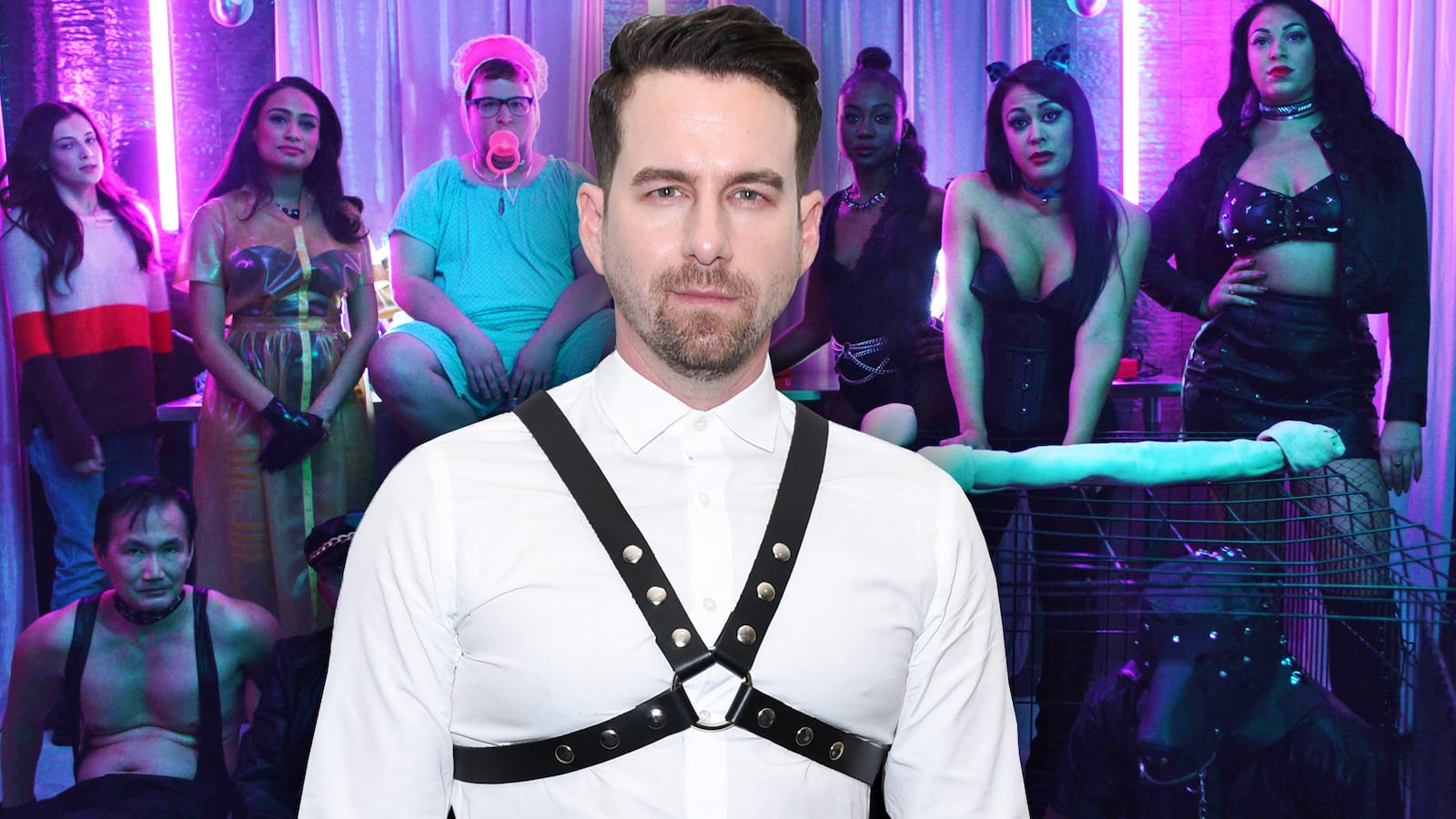There are lots of different BDSM scenes in the Netflix comedy drama Bonding: the man who dresses as a penguin and wants to wrestle, the female partner of a man who wants to punch someone, the scary guy who wants to do real harm.
But at the heart of Bonding—for which Rightor Doyle is writer, director, showrunner, and executive producer—what is more involving than all the sex we see is the complex relationship of central characters Pete (Brendan Scannell) and Tiff (Zoe Levin).
Pete is loosely based on Doyle himself, who at 22, fresh in New York and trying to make it as an actor, became the bodyguard of his longtime friend, a real-life female dominatrix just like Tiff, whom he declines to name.
“What you see on screen is highly fictionalized, and my ‘Tiff’ was nothing like the character of Tiff, who is quite hard. She was joyful and lovely.”
Doyle, now 35 and starring in Barry, did the gig for six months, on and off. “The idea was that I would act as a witness of a kind. If it was an offsite job, you’re putting yourself into the hands of someone you don’t know and having a companion there can defuse any of the wrong kind of tension or danger. Consent is very sexy in dom culture. It’s part of the code you live by: the person needs a specific thing, and the dominatrix will supply that in a very specific way.”
The show has been criticized by dominatrixes and those within the BDSM community for—as IndieWire reported—casting “a bad shadow and stigma on professional domination,” as Mistress Synful Pleasure wrote. Others have criticized Doyle for not consulting enough people in the BDSM community in writing the show.
In response to the criticisms, Doyle told The Daily Beast: “I am very much listening to what the community has to say. The discourse happening on Twitter is important and I receive it fully. I am glad that these many differing opinions are being heard in an impactful way. They have certainly impacted me.
“Though it is based on a small chapter in my life and I did consult people in the community prior to filming, if given the opportunity to make more, I would be thrilled to invite a wide array of people into the conversation to deepen and enrich our knowledge of the world.
“The reach of Netflix is vast and hopefully Bonding, with its bright colors and comedic flourishes, helps change certain preconceived notions of this line of work. Tiff and Pete are not perfect, and I am certainly not perfect. But we can all learn and grow together.”
In an Instagram post, Doyle said he saw the show “as a way of dissecting the many ways the patriarchy had had a stranglehold over sexuality and shame.”
“As a young gay man still struggling with my own sexuality, guarding a door while one of my best friends from home tied a naked man to a four poster bed and whipped him was jarring to say the least, but to my surprise it eventually freed me of many of my own sexual hang-ups.”
In light of #MeToo, these stories became, for Doyle, “allegories on power, secrets, and consent.”
Doyle told The Daily Beast that hopes the show helps destroy the shame that people feel around all kinds of sex. What he hadn’t expected doing the job was to learn so much about “the way people communicate sexually and the specificity of what people need. It made me wish I was that honest in my life. My friend made it very fun for me. It could be a very intense situation, and then she would shoot me this little look to say, ‘We’re fine,’ and we started laughing.”
Doyle’s friend, also a student at university like Tiff on the show, was “super-intelligent” and could read people very well, he said.
He laughs today to recall how shocked he was to hear someone wanting to be pissed on. “In gay culture that’s not so bad. But back then, I was like, ‘Oh my God. Fucking excuse me.’ I never thought of that. I thought you only peed on someone only and specifically if they had been stung by a jellyfish, and even then it was an act of love.”
The look of Bonding is colorful and bright; more David LaChapelle than a stereotypical sex dungeon aesthetic. Doyle said he wanted to focus less on the kinds of sex in BDSM than to ask why people had it and what it means in the context of their lives. It is also about the co-dependency of Pete and Tiff themselves, which again is based on the relationships Doyle had with his close female friends.
“When I was 22 I was just coming out of the closet, so sexually I was not really evolved. I was learning to accept myself. Sex was bad, a secret disease that had taken over my body. In Bonding, people are doing things which you may judge, but then I want you to ask yourself about those judgments and to think about who these people really are.”
The show follows the 2015 TV series he created, The Walker, which he wrote based on his experiences of escorting famous friends to glamorous Hollywood parties.
“It was a weird thing. We were good friends, and yet the world saw me as this accessory if we were photographed when we were out. We were equals, and these women are the loves of my life, and I’m so happy for their success. But that whole experience showed me how the world sees that Hollywood world. At the parties we were seen as ‘Will and Grace,’ and back at home we were real and equal. But we survived!”
Doyle saw how insanely ageing was adjudicated by Hollywood, particularly for women, and “that if you don’t keep good people around you, you’ll lose yourself.”
Doyle grew up in New Orleans (13 generations of his family are from there, he said), the middle child between older twins (a boy and girl) and a younger brother. His parents, liberal and “wonderful,” would have welcomed if he had come out as a teenager, but Doyle did not. He said he was an angry child, with a huge ego, believing himself to be very special and not “getting my rightful due.”
He sang, danced, and acted at junior school, but at his all-boys Catholic high school “I was called a faggot every day. I failed myself out of high school. I wrote my name at top of tests, and turned them in blank. People aren’t afraid of gay people, but people are afraid of crazy people, and the bullies they laid off me after that. It was a weird way of asserting my own power.”
Doyle thought if he didn’t have sex with anyone “then I wouldn’t have to classify myself in any way. Everyone called me ‘gay’ so much that I thought I had to fight back against it. Now, it’s so amazing younger LGBT people can embrace who they are. ‘Gay’ was such a derogatory term when I was younger.”
All of his best friends were girls. “They were my protectors, educators, and confidantes. My relationship with them felt romantic in many ways. Even without sex there can be romance.”
At Bard College, he found “everyone had read Ulysses,” and he began to value learning again. “I realized I couldn’t be the baddest bitch in the room. I had to focus and learn.” After college in New York, he tried to be the actor “doing Chekhov and plays where people slit their throats, but I realized there was someone else much cooler and better than me doing that work.”
A mentor advised him to lean into his gayness, to accept being a ‘type,’ and accumulate experience for his acting toolbox. That was freeing, Doyle said. He started having sex, although—unlike his friendships with women—it took him a little more time to develop such close friendships with other men.
It was around this time that his bodyguard work began. Pete is probably more naïve and sheepish than he was, said Doyle.
Making Bonding was a “real slog.” The show was shot in 20 days, with cast and crew working from 4 a.m every day, a “labor of love.” He hopes it looks “like a $10 million thing.” Naturally, he would love Netflix to commission a second season. “What I did with my friend felt very weird and private and small. I don’t know if I was able to process it at that time. With a decade or more in between, I was able to see how a small kernel of story could become about something bigger.”
The complicated friendship of Pete and Tiff is an extension of Doyle’s own experiences: gay men and straight women are two disenfranchised groups, he said, and in Bonding we see a member of each of those groups vie for power. Tiff is a not just a dominatrix, but also dominant in the friendship with Pete, and Bonding follows the pair as they see how and if this relationship can be equal.
Another telling moment is when Pete’s potential partner tells him he’s not as special as he thinks; this isn’t said or intended cruelly, but more as a reminder that humans share many shades of similar experiences. “I thought of myself as so special as a child, and the dark truth I wasn’t as special and dark as I thought.”
Doyle's parents love Bonding. There’s nothing he could tell them which would shock them, he said. “They love their super-verbose, says-whatever’s-on-his-mind gay son.”
He came out to them at 22. “I had been asked on a date by a famous person, and thought it would be the perfect way to come out to them.” He laughed. “I thought the famous person would cancel out my news.” Instead, his parents were nonplussed by both. “They didn’t care about me being gay, or the famous person. They just said, ‘Have a great time.’”
Right now, Doyle is single. “I like to call myself Rapunzel and the witch. I put myself in the tower and cut my own hair and just wait for some growth. I live in Los Angeles. It’s harder to date there than in New York, where you walk down the street and think life could go in any direction. In Los Angeles, you think, ‘I can’t believe I just masturbated for the fifth time today. I haven’t left my apartment.’” Doyle said he prefers to meet people face to face than on apps. Marriage and children are certainly possibilities, if and when he finds that elusive right person.
Like the real-life experience which changed Doyle, he hopes Bonding ultimately adds to understanding.
“The message of the show is ‘don’t be scared.’ I’m more vanilla than I would ever want to let on. But it’s funny; when we’re young, we’re taught that sex is bad. But sex is part of life, and can be joyful, painful, exciting, thrilling. I’m still a judgmental person, and people may have many judgments about me, but maybe Bonding will give them more understanding and empathy and an ability to listen. I hope it goes way beyond ‘my funny story.’”







